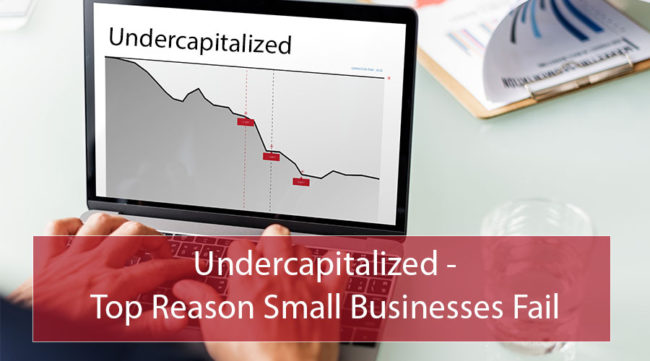What is under-capitalization?
Under-capitalization is when your business does not have enough capital or funds to perform your normal business operation or pay your bills.
You may run a financially successful business, but being under-capitalized means your don’t have the necessary capital to meet an unexpected increase in demand or an unforeseen circumstance.
An under-capitalized business has a higher risk of declaring bankruptcy due to an inability to pay your businesses financial obligations.
Under-Capitalized – Top Reason Small Businesses Fail
The top overall reason why small businesses fail is due to being under-capitalized, not having enough cash to sustain your business operations. Not having the capital to grow, hire new people that will allow your business to grow, or not having the capital for inventory to profit from is a death blow to anyone.
Things that are overlooked during the startup phase will come back to haunt you. Having a capital reserve is an absolute necessity or having a strong relationship with your bank or lender can often save a business.
Eventually, your business will plateau, and you may not have the capital available to help you not only get over a “hump” but also to maintain cash flows for daily business operations. One small emergency can cause you to deviate from your current cash allocations and cause you to spend elsewhere while exposing your business to a future downfall.
Tips for Avoiding Under-capitalization of Your Business
A trait that is common in many successful business leaders is their ability to anticipate, pivoting your business when an unexpected circumstance pops up.
Here are a couple of tips to help you avoid being under-capitalized.
1 – Have a detailed business plan
A detailed business plan may be necessary for potential investors or for a traditional bank loan. These potential lenders want to see that you’ve thought through why you need the money and how this money will help your business grow.
2 – Establish Credit History with a Lender
Again, a trait among successful business owners is the ability to anticipate your business and market needs. This is especially important when it comes to acquiring a business loan/funding. It’s easier to get funding when your finances are showing a profit or consistent revenue performance. One or two negative balance months will make lenders nervous about your ability to generate enough revenue to pay your financial obligation.
Look to acquire funding early in the process with a bank or alternative lender, establish a history of making your payments on time. By establishing this history, it may make it easier to get funding with that same lender once you are eligible and in need.
Options to Ensure Your Business Has Capital
If you are a startup, getting capital is challenging due to the high-risk banks and lenders associate with an unestablished business. You can still find financing for your business through:
Business Grants – money given to a business by the government, an organization, or a person for a specific purpose.
Angel Investors – when an individual investor provides you with capital in exchange for an equity stake in your company.
Crowdfunding – a way for individual or business to invest or donate to a project in return for a reward or profit. It’s not just an individual investing (or donating), it is multiple parties (hence the “crowd”) providing money for your project.
Factoring – financing method where a business owner sells accounts receivable to a third-party funding source to raise capital.
Alternative Lenders – If your bank informs you early on that they would not be able to accommodate a possible financial need through a line of credit you do have options.
Alternative lenders, such as Small Business Funding, are available with funding options such as a working capital advance, business line of credit, factoring, or asset based funding. While often more expensive than a typical bank loan, they do provide immediate help to any short-term business problem.
Startups
Having an original idea about a product or service is often step one to starting a business. Your aspirations to open a restaurant because you love to cook or become a builder because you love working with your hands are just several reasons why people look to start their own business.
Colleges and universities attempt to arm you with the background for whatever it is you aspire to build but cannot teach you everything. While you may know where and how to start there is always something that is forgotten and when you forget or don’t know that often means it will cost.
Managing your finances as a startup is critical to ensuring your long-term success and making sure you always have enough capital to grow your company.

